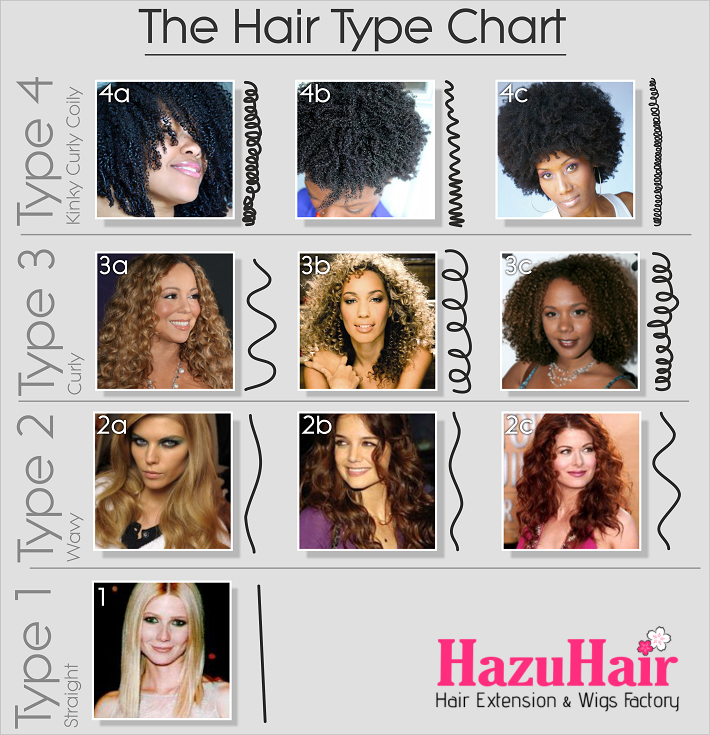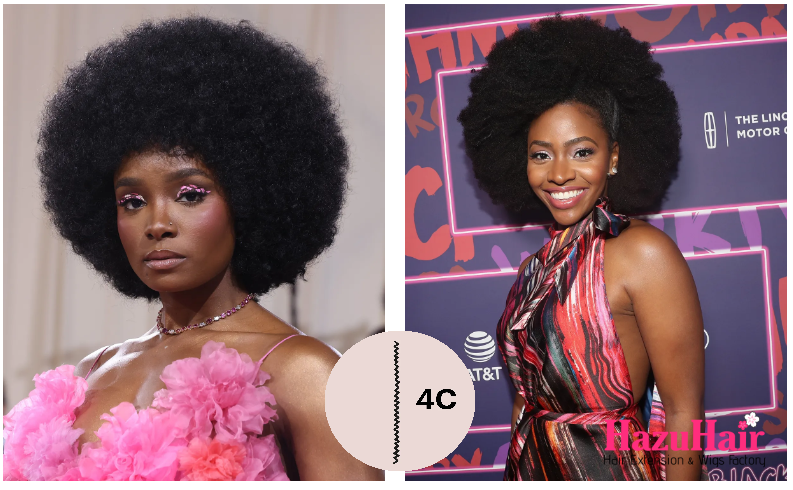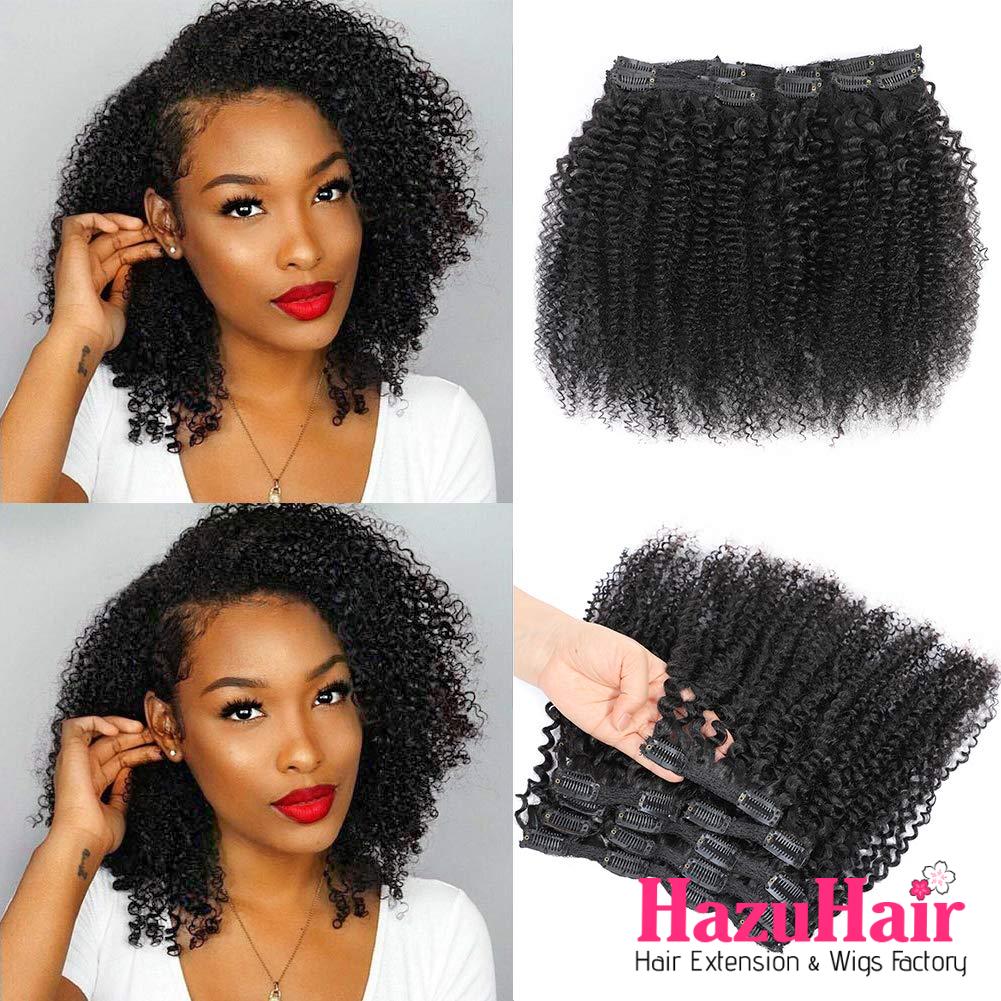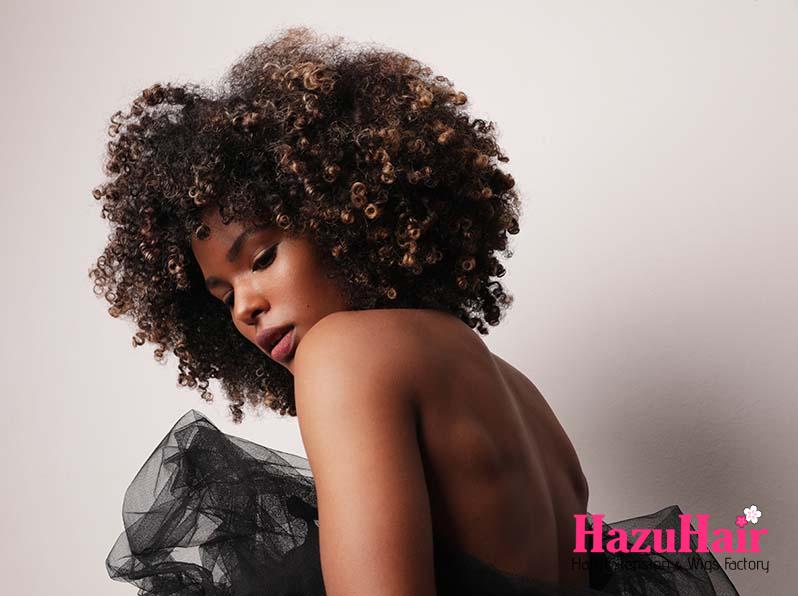Hair knowledge
4C Hair Type: Essential Information You Need to Know!
Hair typing has become a universal way to describe, characterize, and learn how to care for 4C natural human hair extensions.
Some product companies have even taken advantage of the idea that hair typing can help you choose the right products.
As a Natural Hair Stylist with experience working with all hair textures, I have to disagree with those companies.
That said, you can still learn a thing or two by researching the characteristics of your hair type.
Let’s dive into the one hair type that’s often misunderstood: 4C natural hair.

What Exactly is Type 4C Hair?
Type 4C hair features the tightest curls, characterized by a super coily zigzag pattern. These springy curls are compact and fine in texture, giving the hair a dense, full-bodied appearance with plenty of natural volume.
Among all curly hair types, 4C hair is the curliest.

Identifying 4C Hair
To identify 4C hair in its natural state (unstyled and dry), look for a tightly coiled curl pattern that appears less defined and somewhat ‘fuzzy.’ This hair type is highly prone to shrinkage – up to 90% of its actual length!
The texture of 4C hair can vary from fine and thin to wiry and thick, and it tends to be more delicate, requiring gentle care to keep it healthy. Here are some key characteristics:
- Your hair feels dense.
- The strands have a zig-zag pattern.
- The curls are so tightly looped that you can only see individual strands when viewed up close.
- Your natural hair forms a voluminous ‘fro’ effortlessly.
- When braided or twisted, your hair holds styles well – making 4C hair very versatile.
- Breakage and shrinkage are significant challenges.
If these traits resonate with you, it’s likely that you have 4C curls!
4C Natural Hair Extensions
For those who prefer to avoid the upkeep of their natural hair but still want to achieve a natural look, 4C clip-in extensions are a great option. These extensions add extra volume and length, making it easy to achieve blowouts, twist-outs, and high ponytails quickly.

Understanding 4C Natural Hair
There’s a lot to learn about 4C natural hair. This hair type can experience shrinkage ranging from 70% to 75%, and without products or manipulation, it often lacks curl definition. The strands are finer in diameter compared to other hair types, which can make it appear coarse, but it’s actually quite dense.
4C hair thrives in low-manipulation environments. Other important characteristics include porosity, the current health of the hair, and the hair care regimen being followed.
Type 4C hair shares the Z-shaped curl pattern of type 4B but is more tightly coiled. When freshly washed and free of products, it doesn’t display a well-defined curl pattern. To enhance curl definition, women with 4C hair often use methods like twisting, shingling, or braiding.
This hair type can vary in texture from fine and soft to wiry and coarse, but it remains the most delicate of all hair types. That’s why many women opt for protective styles like braids and weaves to shield their hair from damage.
The numerous bends and curves in 4C hair strands make it harder for natural oils to reach the ends. The tighter the curls, the more crucial it is to keep the ends moisturized. Close bends can also prevent curls from clumping together, unlike wavy hair, which has more spacing between each curve.

Growing 4C Natural Hair
Growing 4C hair can be challenging, primarily due to its maintenance needs. One key aspect is moisture. Keeping your hair moisturized helps prevent breakage; dry, brittle 4C hair can become extremely coarse and harder to manage, hindering growth.
To encourage growth, you should not only moisturize regularly but also condition your hair often. A healthy diet and staying hydrated also play a significant role in promoting hair growth – when your body is healthy, your hair growth can improve.
While some people suggest hair pills, it’s best to rely on natural remedies and consult a professional if you’re unsure of what your hair needs. After visiting a dermatologist and stylist, I discovered what my hair required, and since then, it has been growing steadily!
For an extra boost, consider using a hair growth serum.
Why Does 4C Natural Hair Grow Slowly?
Many bloggers and YouTubers often overlook a key factor affecting 4C naturals: the condition of their scalp skin.
The health of the scalp is a topic best understood by trichologists, dermatologists, and cosmetologists. As a licensed cosmetologist, I’ve encountered numerous 4C naturals with dry and tight scalp skin.
So, how does this relate to hair growth? The hair follicles are located in the scalp and require good blood circulation to push hair through the skin while also promoting oil gland activity.
That’s why it’s essential to massage your scalp with your fingertips whenever you can. Using a light oil during these massages can help improve blood circulation and nourish a dry scalp.
However, you should only use oil if your scalp truly needs it. Prematurely oiling a healthy scalp can clog the follicles and hinder hair growth.
Shampoo for 4C Natural Hair
Tip #1: Be Prepared to Spend a Little More
Affordable shampoos may not be suitable for 4C hair, as they often tend to be overly drying. Most shampoos are designed for oily hair, while 4C hair typically needs the opposite.
Tip #2: Check the Ingredients List
Pay close attention to the quality of the ingredients. If you see a long list of chemicals you can’t even pronounce, that’s a red flag. While all products will have preservatives for safety and stability, the first ingredient should ideally be water, followed by curl-friendly ingredients.
Tip #3: Look for Key Ingredients
Choose shampoos that include emollients like shea butter and heavier oils like castor oil. Moisturizing formulas tend to be thicker in consistency due to these heavier ingredients.
Tip #4: Avoid Sulfates
Be wary of sulfates, as they can be very drying for your hair. Many products now advertise themselves as sulfate-free because consumers are increasingly seeking this feature. However, some may contain ingredients similar to sulfates, which can strip moisture just the same.
You definitely don’t want to compromise your beautiful 4C hair with a shampoo that doesn’t cater to its needs
Conditioners for 4C Natural Hair
4C hair requires a lot of maintenance. Whenever I wore my hair out, wash day could easily take all day. Initially, I struggled with the conditioning process, often spending hours without seeing much improvement. My hair felt just as coarse after conditioning as it did after shampooing.
Eventually, I learned that there are specific conditioners designed for my hair type – products that could smooth out my kinks without sacrificing my body wave pattern. Here are my three favorites!
- Cantu Coconut Curling Cream: This conditioner is perfect for protective styling. If you need to keep your hair in a protective style for a while, this cream is a must-try! It defines, conditions, and moisturizes while also smoothing down edges when necessary.
- Camille Rose Natural Algae Deep Conditioner: Looking for a deep treatment? This homemade product combines vitamin B and algae, which work together to promote hair growth. With consistent use, your hair will become thicker, stronger, and healthier. Plus, it deeply moisturizes and softens your hair, giving you everything you need to look fabulous.
- ORS Curls Unleashed Shea Butter and Honey Curl Defining Crème: Struggling with shrinkage? This fantastic conditioner adds shine to your hair while defining your kinks and coils for a stunning look. The best part? It helps minimize shrinkage, so you can enjoy your natural curls without the frustration.
Hair Oils for 4C Natural Hair
1. Coconut Oil (Pure & Unrefined)
Coconut oil is packed with monounsaturated fatty acids and vitamin E, both of which promote hair growth, enhance length retention, reduce breakage, and strengthen the hair. Its unique properties help inhibit water absorption from the air, preventing strand swelling and keeping moisture locked in. This is especially beneficial for high porosity hair.
Coconut oil works wonderfully as a pre-poo treatment or when mixed with your favorite conditioner, as it helps detangle your hair naturally. You can also use it to add shine, combat frizz, and as part of the sealing process in the LOC method.
2. Castor Oil (Jamaican Black)
Jamaican black castor oil is rich in unsaturated fatty acids, vitamin E, protein, and minerals, making it one of the best oils for encouraging hair growth. It’s well-known for helping to regrow edges and kickstart overall hair growth. This nutrient-rich oil increases blood flow to the scalp, leading to thicker, stronger, and longer hair.
With its antibacterial and antifungal properties, castor oil helps eliminate dead skin cells from the scalp and stimulates hair follicles. Since it’s quite thick, a little goes a long way, so be mindful of how much you use. Applying it to your edges can aid in their growth and address issues like dryness, brittleness, or balding spots.
3. Olive Oil (Extra Virgin)
Olive oil acts as a natural conditioner that penetrates the hair shaft better than many other oils, nourishing, softening, and strengthening the hair. It has anti-inflammatory properties that help combat dandruff and product buildup on the scalp, while also reducing hair loss by protecting your hair from damage.
This oil is excellent for scalp massages, which can stimulate hair growth and maintain a healthy scalp. You can add it to your spray bottle to keep your hair moisturized throughout the week. Due to its ability to penetrate the hair shaft, olive oil is also great for hot oil treatments, leaving your hair looking and feeling softer and stronger.
4. Avocado Oil
Packed with vitamins A, B, D, and E, as well as protein, amino acids, magnesium, iron, copper, folic acid, and fatty acids, avocado oil is fantastic for protecting hair and preventing damage. It helps lock in moisture and shields your strands from sun damage.
Avocado oil contains 72% monounsaturated fats, even more than coconut oil, which nourish the hair and give it a beautiful shine. Adding avocado oil to your shampoo can help treat a dry, itchy scalp, while including it in your conditioner provides excellent slip for easy detangling.
5. Jojoba Oil (Pure & Unrefined)
Jojoba oil often doesn’t receive the recognition it deserves. Like avocado oil, it effectively addresses dry scalp, hair loss, and helps prevent split ends. What sets jojoba oil apart is its ability to mimic your hair’s natural oil (sebum), allowing your strands to absorb it deeply, resulting in more moisturized and shinier hair.
It’s rich in vitamins A, B1, B2, B6, and E, which work together to protect against damage. With a remarkable 98% monounsaturated fat content, jojoba oil is excellent for strengthening hair and reducing breakage.
In addition to adding volume and encouraging growth, jojoba oil helps hair recover from damage. It’s also ideal for scalp massages, providing benefits without weighing your hair down. When used in deep conditioners, it helps hair bounce back, particularly after heat styling. Its lightweight nature makes it a great option for those with low porosity hair.
Oils for Tight or Dry Scalp
- Lavender
- Rosemary
- Chamomile
- Ylang Ylang
- Thyme
- Jojoba
- Cedarwood
- Grapeseed
- Carrot
Be cautious with heavy oils like coconut oil, as they may clog hair follicles and the cuticle of the hair strand.
Some oils are more beneficial for the scalp than for the hair itself, and vice versa. You don’t need to oil your scalp every day. Start with twice a week and monitor how your scalp responds. You can also apply oil on wash day while your conditioner is in, rinsing it out as usual.
Oils provide nourishment, and as long as their molecules are small enough to penetrate, you can rinse off any excess and still enjoy the benefits.
Porosity Over Hair Typing
Determining your hair’s porosity is much more helpful for creating a hair care regimen than relying solely on hair typing. Your porosity will guide you on the types of products to use, the appropriate protein treatments, whether to air dry, and more.
Avoid depending solely on hair type to answer all your questions in your healthy hair journey. At my salon, we prioritize porosity, assessing your hair’s history, current condition, and setting realistic hair goals.
Maintaining and Caring for 4C Hair Type
4C natural hair is delicate and requires extra care. Here are some essential tips to keep your hair healthy:
- Deep Conditioning: 4C hair tends to dry out quickly due to its tightly coiled curl pattern. These curls can hinder natural oils from your scalp from reaching the ends, leaving them thirsty for moisture. Deep conditioning at least every two weeks is an excellent way to hydrate your hair and make detangling easier.
- LOC Method for Moisture: Since 4C hair struggles to retain moisture, it’s crucial to not only moisturize regularly but also lock that moisture in. The LOC (Liquid, Oil, Cream) method is effective: start by spritzing your hair with water, then apply a lightweight oil (like coconut or olive oil) to seal in moisture, and finish with a leave-in conditioner for added hydration.
- Protective Styling: Growing 4C hair can be challenging due to shrinkage, which often hides its length and leads to damage. To protect your hair and encourage growth, consider styles like cornrows, weaves, box braids, crochet braids, and Bantu knots. These styles provide excellent protection while allowing you to express your personal style.
- Gentle Detangling: Dryness can lead to knots and tangles, making detangling frustrating and painful. Use a wide-toothed comb or your fingers to detangle, preferably when your hair is damp. Always start from the ends and work your way up to minimize breakage.
- Trimming Split Ends: Split ends can be particularly troublesome for those looking to grow their 4C hair, which naturally tends to shrink. Trimming your hair every six months can help maintain its health and retain length.
- Co-Washing: Shampoo can strip your hair of its natural oils, which is especially detrimental for 4C hair that dries out quickly. Limit shampoo use to once or twice a month and opt for co-washing once a week to cleanse while preserving moisture.
- Avoiding Product Overload: It can be tempting to try every curl-defining cream and leave-in conditioner available, but don’t fall into the product junkie trap. Using too many products can do more harm than good. Stick to one or two trusted products that work well for your hair!
What Does My Hair Need?
For optimal care, a daily cream-based moisturizer with water as the first ingredient is ideal. The frequency of moisturizing depends on your hair’s porosity.
To test your hair’s moisture retention, try moisturizing it at night and wearing a satin or silk bonnet. If your hair still feels dry in the morning, you’ll need to reapply throughout the day. Only high-porosity hair requires oil to seal in moisture after moisturizing.
Incorporating steam hydration treatments every week or two with your favorite hydrating mask or conditioner is another crucial step. Just like our bodies, our curls need water; when your hair is dehydrated, it becomes dry and frizzy, making styles short-lived and products ineffective.
However, avoid frequently wetting your hair, as this can lead to damage known as Hygral Fatigue. Your hair works to open the cuticle to absorb water and then closes to seal it in. Over-wetting can harm the cuticle, leading to a dehydrated appearance.
Instead, dedicate 20-30 minutes to using a hair steamer with your conditioner weekly or bi-weekly.
Let’s Talk Trims
Most naturals can go 3 to 4 months between trims without issues. However, with 4C natural hair, it’s advisable to have your stylist clip your ends every two months. Due to shrinkage, you might want to stretch your hair with a blow dryer before trimming, so you can see how far up your hair has split.
Be mindful that manipulating your hair – such as twisting nightly, styling your edges daily, or roughly detangling – can lead to breakage. Opt for styles that can last the week, and only manipulate your hair after applying moisturizer.
If you’re experiencing scalp issues, consider medical wigs. For minimal hassle with extensions, check out our Glueless Wigs collection.
By determining your porosity, establishing a care regimen, and selecting low-manipulation styles, you’ll see your hair flourish!
and…

If you’re looking to buy high-quality wigs or hair extensions, look no further than HazuHair.
We are a trusted Vietnamese hair factory with over 100 skilled workers, offering a wide range of hair styles including wavy, curly, straight, kinky, and more.
Our products come in various colors such as natural black, ombre, blonde, red, pink, and many others.
Reach out to us today!
- Hair Factory: Tan Son 2 Village, Tan Dinh, Lang Giang, Bac Giang Province, Vietnam
- Hotline: +849 4949 3883
- Whatsapp Mrs ThanhLam: https://wa.me/84949493883
- Website: https://hazuhair.com
